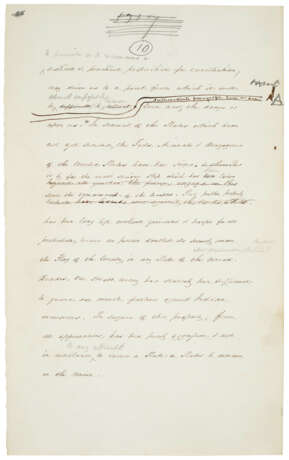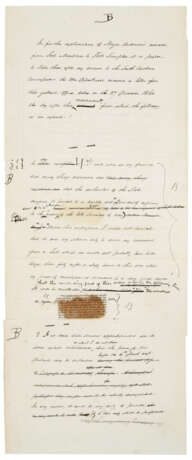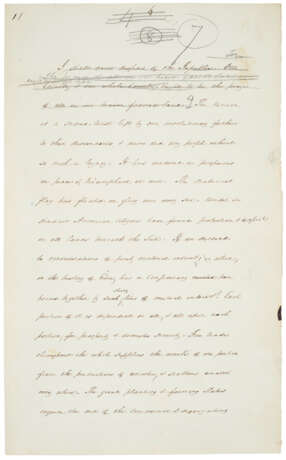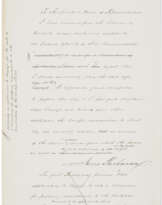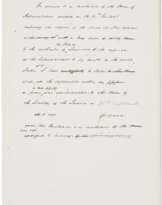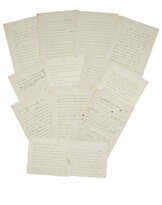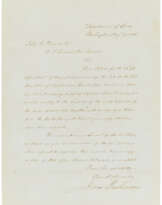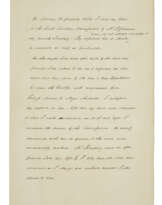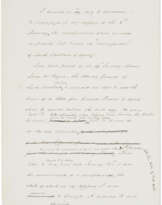ID 1119151
Lot 142 | Resolving to defend Fort Sumter
Valeur estimée
$ 80 000 – 120 000
James Buchanan, 8 January 1861
BUCHANAN, James. (1791-1868); GLOSSBRENNER, Adam John (1810-1889). Autograph mansucript, [Washington, 8 January 1861].
15 pages, most 345 x 215mm with two 155 x 210mm sheets pinned a 345 x 215mm sheet (occasional light soiling). Six pages in the hand of Buchanan with the balance in the hand of Glossbrenner, his private secretary.
James Buchanan's draft of his public response to South Carolina's demands for the surrender of federal forts in Charleston Harbor: "the right and the duty to use military force defensively against those who resist the Federal officers in the execution of their legal functions and against those who assail the property of the Federal Government is clear and undeniable."
On 26 December 1860, less than a week after South Carolina formally seceded from the Union, Major John Anderson, in command of the federal garrison from the indefensible Fort Moultrie to the more secure Fort Sumter—raising the real possibility that secession might lead to war. Meanwhile, a delegation from South Carolina was in Washington demanding Anderson's withdrawal from all three federal installations. Buchanan and his cabinet deliberated from the 27th to the 31st. While some in his cabinet, most notably Secretary of War, John B. Floyd and Secretary of the Interior, Jacob Thompson counseled that the President surrender the forts, Attorney General Edwin Stanton, Postmaster General, Joseph Holt and Secretary of State Jerimiah Black insisted the President deny South Carolina's demands. On 31 December Buchanan resolved to spurn the South Carolinians, resolving to defend the fortress if attacked. The next morning, Buchanan appointed Joseph Holt Secretary of War, in the place of John B. Floyd, who had resigned on 29 December and gave orders to both the War and Navy departments to begin secret preparation to reinforce Anderson's garrison.
Interestingly, the most heavily-edited portion of this message concerns the communications of Major Anderson and the War Department. Three pages have been pinned together with a news clipping of the orders given to Anderson that authorized him to take the liberty of moving his forces. Buchanan was keen to underscore that Anderson made the move independently of any direct orders from Washington—but rather that Anderson had made the move according to his own judgement—in an effort not to provoke the South Carolinians. Yet in the body of his message, Buchanan resolves that while he, "certainly had no right to make aggressive war upon any State, and" was "perfectly satisfied that the Constitution has wisely withheld that power even from Congress. But the right and the duty to use military force defensively against those who resist the Federal officers in the execution of their legal functions and against those who assail the property of the Federal Government is clear and undeniable." He adds that the "Union is a sacred trust left by our revolutionary fathers to their descendants; and never did any other people inherit so rich a legacy. It has rendered us prosperous in peace and triumphant in war. The national flag has floated in glory over every sea. . . . Should the Union perish in the midst of the present excitement we have already had a sad foretaste of the universal suffering which would result from its destruction. The calamity would be severe in every portion of the Union, and would be so great, to say the least, in the southern as in the northern States. . . . Would that South Carolina had been convinced of this truth before her precipitate action! I, therefore, appeal through you to the people of the country to declare in their might that the Union must and shall be preserved by all constitutional means." The final text was published in John Basset More, ed., The Works of James Buchanan. Philadelphia & London: J. B. Lippincott Company, 1910. Vol. 11, pp. 94-99.
| Artiste: | Adam John Glossbrenner (1810 - 1889) James Buchanan (1791 - 1868) |
|---|---|
| Catégorie maison de vente aux enchères: | Lettres, documents et manuscrits |
| Artiste: | Adam John Glossbrenner (1810 - 1889) James Buchanan (1791 - 1868) |
|---|---|
| Catégorie maison de vente aux enchères: | Lettres, documents et manuscrits |
| Adresse de l'enchère |
CHRISTIE'S 20 Rockefeller Plaza 10020 New York Etats-Unis | ||||||||||||||
|---|---|---|---|---|---|---|---|---|---|---|---|---|---|---|---|
| Aperçu |
| ||||||||||||||
| Téléphone | +1 212 636 2000 | ||||||||||||||
| Fax | +1 212 636 4930 | ||||||||||||||
| Conditions d'utilisation | Conditions d'utilisation | ||||||||||||||
| transport |
Service postal Service de messagerie ramassage par vous-même | ||||||||||||||
| Modes de paiement |
Virement bancaire | ||||||||||||||
| Heures d'ouverture | Heures d'ouverture
|
